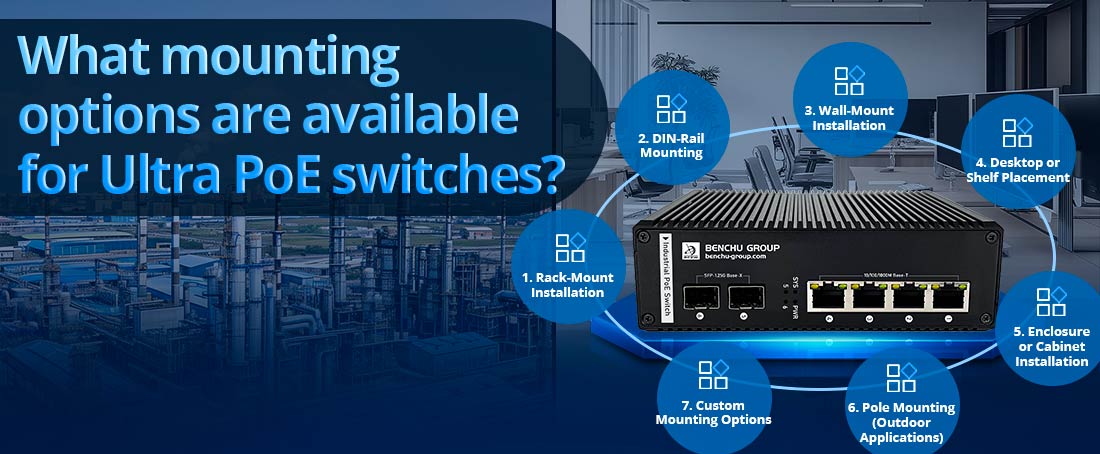
Коммутаторы Ultra PoE предназначены для универсального использования в различных условиях, включая промышленные помещения, офисные помещения и наружное применение. Для поддержки этих разнообразных вариантов использования производители предлагают различные варианты монтажа, которые обеспечивают стабильность, доступность и эффективное использование пространства. Ниже приведено подробное описание распространенных вариантов монтажа, доступных для коммутаторов Ultra PoE:
1. Установка в стойку
Монтаж в 19-дюймовую стойку: Это один из наиболее распространенных вариантов монтажа, особенно на предприятиях и в центрах обработки данных. Коммутаторы предназначены для установки в стандартную 19-дюймовую стойку (обычно высотой 1U или 2U).
Кронштейны и винты: Выключатели, монтируемые в стойку В комплект поставки входят монтажные кронштейны и винты, позволяющие надежно закрепить коммутатор на направляющих стойки.
Преимущества:
--- Эффективное использование пространства: максимальное использование доступного пространства за счет размещения нескольких коммутаторов и сетевого оборудования в одной стойке.
--- Простота доступа: обеспечивает организованный и простой доступ для обслуживания, прокладки кабелей и мониторинга.
--- Вентиляция: Обеспечивает надлежащий поток воздуха для охлаждения в средах с высоким выделением тепла.
2. Монтаж на DIN-рейку
Крепления на DIN-рейку: Популярный выбор для промышленных объектов, таких как заводы, производственные линии или электроподстанции. DIN-рейка — это стандартная металлическая рейка, используемая для монтажа промышленного оборудования управления.
Зажим или брекет-система: Коммутатор имеет встроенный или съемный зажим, который фиксируется на DIN-рейке.
Преимущества:
--- Компактная установка: обеспечивает безопасность коммутатора и легкость его интеграции с другим оборудованием промышленной автоматизации.
--- Простая установка/снятие: система зажимов позволяет быстро устанавливать и легко снимать для обслуживания или замены.
--- Устойчивость к вибрации: идеально подходит для применений, в которых могут наблюдаться движения или вибрации, обеспечивая надежную фиксацию переключателя на месте.
3. Установка на стену.
Настенные кронштейны: Многие коммутаторы Ultra PoE поставляются с кронштейнами или корпусом, позволяющим монтировать их непосредственно на стену.
Крепление винтами: Коммутатор можно прикрепить к стене с помощью винтов и монтажных кронштейнов, чтобы обеспечить его устойчивость и надежность.
Преимущества:
--- Экономия места: хороший вариант, когда пространство на полу или стойке ограничено.
--- Универсальное размещение: полезно в таких местах, как наружные установки (например, сети камер), склады или удаленные станции мониторинга.
--- Доступность: Может располагаться на разной высоте для облегчения доступа и прокладки кабелей.
4. Размещение на рабочем столе или на полке.
Размещение на плоской поверхности: Это простой вариант для коммутаторов, предназначенных для размещения на рабочем столе, полке или рабочей станции.
Нескользящие ножки: Некоторые переключатели оснащены резиновыми ножками, обеспечивающими устойчивость на плоской поверхности.
Преимущества:
--- Простота установки: дополнительное монтажное оборудование не требуется, что упрощает развертывание.
--- Мобильность: можно перемещать или перемещать с минимальными усилиями.
--- Временные настройки: идеально подходят для временных сетей, тестовых сред или использования в домашнем офисе.
5. Установка корпуса или шкафа.
Промышленные шкафы: Для установок с высоким уровнем защиты коммутаторы можно размещать в герметичных сетевых шкафах или корпусах, соответствующих стандартам защиты окружающей среды.
Наружные корпуса: Для суровых условий эксплуатации на открытом воздухе переключатели можно разместить в защищенных от атмосферных воздействий корпусах, обеспечивающих защиту от пыли, воды и экстремальных температур (например, со степенью защиты IP65).
Преимущества:
Повышенная защита: Защищает коммутатор от суровых условий окружающей среды, включая влагу, пыль и колебания температуры.
Безопасность: Шкафы можно запирать, чтобы предотвратить несанкционированный доступ.
Организация: Гарантирует, что все сетевые устройства сгруппированы и защищены в одном центральном месте.
6. Монтаж на столбе (наружное применение)
Комплекты для монтажа на столбе: Для наружной установки, например, для наблюдения за городом или дорожного движения, можно использовать комплект для крепления на столбе, чтобы надежно прикрепить коммутатор к столбу.
Ремни и зажимы: Монтажный комплект обычно включает металлические ремни или зажимы, которые оборачиваются вокруг опоры и закрепляют выключатель на месте.
Преимущества:
Стратегическое позиционирование: Позволяет размещать на возвышении для оптимальной прямой видимости и покрытия.
Долговечность: Обеспечивает стабильный, виброустойчивый вариант крепления для наружных условий.
7. Варианты индивидуального монтажа
Индивидуальные решения: В зависимости от конкретных отраслевых требований могут быть доступны специальные монтажные решения, включая угловые кронштейны или крепления, предназначенные для уникального позиционирования.
Сторонние аксессуары: В некоторых случаях сторонние поставщики предлагают специализированные монтажные комплекты, совместимые с различными PoE-переключатели для нестандартных настроек.
Соображения при выборе варианта монтажа
Условия окружающей среды: Если коммутатор будет использоваться в суровых условиях, выберите вариант монтажа, обеспечивающий необходимую защиту (например, закрытое или защищенное от атмосферных воздействий крепление).
Требования к доступности: Выберите вариант монтажа, обеспечивающий легкий доступ для обслуживания, особенно если требуются частые регулировки или проверки.
Наличие места: Убедитесь, что выбранный метод монтажа позволяет максимально эффективно использовать доступное пространство, будь то в центре обработки данных, на промышленном предприятии или в небольшом офисе.
Управление теплом: При выборе метода монтажа необходимо учитывать правильную вентиляцию и охлаждение, особенно в закрытых установках или установках, монтируемых в стойку.
Эти варианты монтажа обеспечивают гибкость установки коммутаторов Ultra PoE в различных условиях: от контролируемых помещений до суровых условий на открытом воздухе или в промышленных помещениях, гарантируя надежное сетевое подключение и питание PoE.